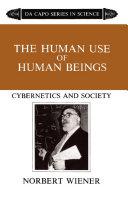Quotes from book
The Human Use of Human Beings

The Human Use of Human Beings is a book by Norbert Wiener, the founding thinker of cybernetics theory and an influential advocate of automation; it was first published in 1950 and revised in 1954. The text argues for the benefits of automation to society; it analyzes the meaning of productive communication and discusses ways for humans and machines to cooperate, with the potential to amplify human power and release people from the repetitive drudgery of manual labor, in favor of more creative pursuits in knowledge work and the arts. The risk that such changes might harm society is explored, and suggestions are offered on how to avoid such risk.

“To live effectively is to live with adequate information.”
Source: The Human Use of Human Beings (1950), p. 17-18

“Any labor which competes with slave labor must accept the economic conditions of slave labor.”
Source: The Human Use of Human Beings (1950), p. 162